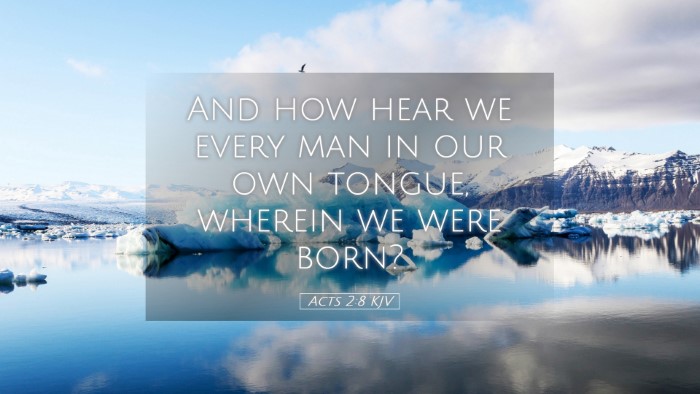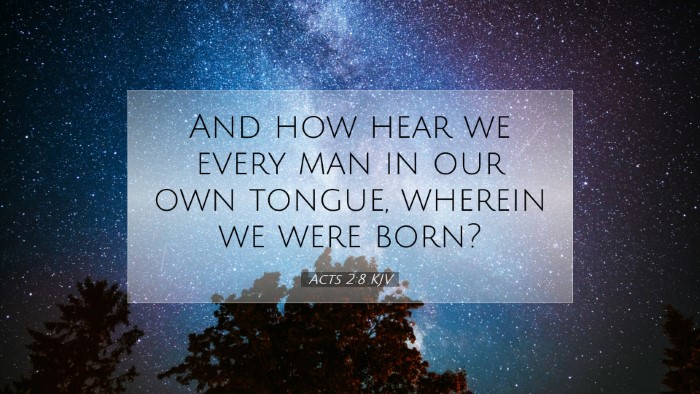Commentary on Acts 2:8
Acts 2:8 (KJV): "And how hear we every man in our own tongue, wherein we were born?"
Contextual Overview
This verse is part of the larger narrative of Pentecost, where the Holy Spirit descends upon the apostles, empowering them to speak in various languages. This miraculous event not only signifies the outpouring of the Spirit but also serves as a pivotal moment in the early church's mission to spread the Gospel.
Insights from Commentaries
Matthew Henry's Commentary
Matthew Henry emphasizes the miraculous nature of the event, noting that it was a divine act of God to enable the apostles to communicate with a diverse audience. He highlights that this act fulfills the prophecies of the Old Testament regarding the spread of God's word to all nations. Henry also points out the significance of hearing the Gospel in one’s native tongue, as it underscores God's desire for all peoples to understand His message clearly and personally.
Albert Barnes' Notes
Albert Barnes elaborates on the amazement of the crowd as they hear their native languages spoken. He notes that this phenomenon serves two purposes:
- 1. Witness of the Power of God: The ability of the apostles to speak various languages is a clear manifestation of divine power, indicating that God is fulfilling His promise to empower the church.
- 2. Inclusion of All Nations: Barnes stresses that this speaks to the inclusiveness of the Gospel. Every nation represented at Pentecost hears the message of Christ, which indicates the universal reach of the Christian faith.
Adam Clarke's Commentary
Adam Clarke provides a detailed analysis of the languages spoken, asserting that they represent the diversity of the Jewish diaspora. He highlights that each individual heard the message in their own dialect, which emphasizes God's wisdom in spreading the Gospel. Clarke also discusses the theological implications, noting that this event signifies the reversal of the Babel incident, where languages were confused, demonstrating God’s intention to unite rather than divide.
Theological Reflections
The miracle at Pentecost serves as a reminder of God's sovereignty in salvation. By allowing people from different parts of the world to hear the message in their own language, God emphasizes the personal nature of His grace. Each individual’s understanding of the Gospel is not just an abstract message but a personal invitation to relationship with Christ.
Divine Empowerment
This moment underscores the role of the Holy Spirit in empowering believers to fulfill the Great Commission. The apostles’ ability to speak in tongues is a picture of the empowerment that believers receive to witness and share the Gospel effectively, regardless of linguistic or cultural barriers.
Unity and Diversity
The event at Pentecost illustrates the beautiful interplay of unity and diversity in the body of Christ. While the church is made up of many nations and tongues, the Gospel binds believers together, transcending cultural differences and fostering a sense of community and mission.
Practical Applications
For pastors and church leaders, Acts 2:8 serves as a call to embrace diversity in their congregations. It challenges the church to recognize and celebrate the various cultural backgrounds and languages represented among its members. Moreover, it highlights the importance of clear and effective communication of the Gospel message within diverse contexts.
For Students and Theologians
This verse and its surrounding context provide rich material for theological study regarding the nature of revelation, the work of the Holy Spirit, and the Church's mission. Students can examine how the phenomenon of speaking in tongues functions within the early Christian community and its implications for contemporary ecclesiology.
Conclusion
Acts 2:8 stands as a profound testament to God’s miraculous workings and His heart for humanity across cultures. It invites believers to partake in the ongoing narrative of the Gospel being shared and understood by all people, calling them into a relationship that transcends linguistic and cultural barriers. In the spirit of Pentecost, the church today is empowered to continue the mission of proclaiming the Gospel to every nation, tribe, and tongue.


